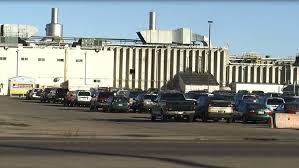
The New York Times reported on a public nuisance lawsuit filed against Smithfield Foods for COVID-19 exposure created by a pork processing plant in Milan, Missouri.
What’s novel about the public nuisance suit is that it sues Smithfield for its effect on the surrounding community, not its employees.
Meatpacking plants are a hotbed of COVID-19 exposure in small cities and rural areas across the country. In Nebraska, workers at JBS Swift in Grand Island and Tyson in Lexington have high rates of COVID-19 exposure. Reports trace nearly 40 percent of COVID-19 exposures in Grand Island to JBS.
The Missouri case against Smithfield describes how fast line speeds help spread COVID-19. Workers and their advocates have long expressed concerns about line speed in meat packing plants. Line-speed is related to widespread joint and muscle injuries in packinghouses.
In my job, I spend a fair amount of time in both Grand Island and Lexington litigating against JBS and Tyson. Because of that experience, I’ve watched in anger/horror as COVID-19 tears through these communities. In my view, the same indifference that Tyson and JBS show about joint and muscle injuries has been shown about COVID-19.
Skirting the exclusive remedy of workers’ compensation
Part of my anger about COVID-19 in Lexington and Grand Island goes to the difficulty of recovering workers’ compensation benefits for COVID-19. Workers’ compensation laws provide little deterrent for packinghouses to limit COVID-19 exposure. Even if an employee can prove on the job exposure, workers can collect limited benefits from workers’ compensation. Workers’ compensation benefits are limited because employees are supposed to collect them without regard to fault.
Limited in benefits in exchange for not proving fault is at the heart of the so-called grand bargain of workers’ compensation. Workers compensation benefits are generally the exclusive remedy employees have for workplace injury and illnesses.
But a public nuisance claim skirts the problems with workers’ compensation laws. A public nuisance claim sues the packinghouses not for how they treat their workers, but for how their treatment of their workers effects the surrounding community. Exclusive remedy means that the workers can only sue their employers for a workplace injury or illness under workers’ compensation. Workers can only collect limited benefits from workers’ compensation.
Public nuisance is a legal theory that the packinghouses know well. Environmental advocates successfully used the tactic against a Smithfield subsidiary in North Carolina. I hope worker safety advocates obtain a good outcome in the Missouri case. I hope these suits spread to plants in other states.

